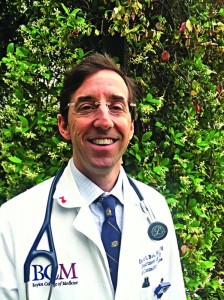 Working toward a “more caring” approach, Dr. David Buck ’83 believes it’s possible to save billions of dollars while giving the needy better healthcare.
Working toward a “more caring” approach, Dr. David Buck ’83 believes it’s possible to save billions of dollars while giving the needy better healthcare.
“It’s quite a cruel system that can precipitate and maintain homelessness,” said the family physician and healthcare-reform advocate.
For more than 25 years, Buck has worked to improve treatment for the impoverished. He’s president of Healthcare for the Homeless-Houston, which he founded in 1999 as a two-room medical clinic and developed into a collaboration of organizations. Last year the group provided care through clinics, outreach initiatives, and support services to 10,000 disadvantaged clients. Homeless people serve on the organization’s governing board “so we don’t lose the voice of the street,” Buck said.
Awarded the American Academy of Family Physicians’ Public Health Award in 2013 for “extraordinary contributions to the health of the American public,” Buck also heads Houston’s Primary Care Innovation Center (PCIC). He founded the nonprofit to improve quality and reduce costs by coordinating support for “super utilizers” — the top 1 percent of patients according to the number of medical visits and costs.
“Of the $2.8 trillion spent on healthcare in America, half is allocated to five percent of the population,” Buck said. “We can save about 30 percent of costs by coordinating their care, and even more important than that is the difference changing their community infrastructure makes.
“It’s a passion of mine to figure out how to use evidence-based guidelines to inform our care,” he said. Through the PCIC, two years of research has led to the third phase of programming which just now is bringing in 15 “super utilizer” clients every three months for newly designed care coordination. He’s excited about the possibilities, noting that their studies show even small changes in care delivery, such as providing same-day appointments, can substantially improve participation and outcomes.
In 2006, Buck established Houston’s Doctors for Change and the Jail In-reach Project, and in 2008, he founded the Albert Schweitzer Fellowship—Houston-Galveston. Three years ago he served on the U.S. Department of Health and Human Services advisory board for health reform, developing a plan for the nation’s new healthcare exchanges.
Still a practicing physician, Buck also is a professor at Baylor College of Medicine, where he earned his M.D., and an adjunct professor at the University of Texas Health Science Center at Houston where he earned a master’s in public health prior to med school.
Buck’s CV includes an impressive list of publications, roles on nonprofit boards, involvement in professional organizations, and awards such as the Texas Medical Association Foundation’s 2014 Champion of Health Award and the Texas Academy of Family Physicians’ Public Health Leader Award for both 2012 and 2013.
“It’s just such a gift…the thought of being able to be useful,” Buck said about his life’s work. “There’s a CC thread through all of this. I had dreams there that I was finally being allowed to breathe. I was being given a chance.
“I really didn’t learn how to think or write until I went to CC. There I gained the skills to think critically and a framework for life-long learning….So much of what I’ve done has been on the block-style plan,” he said.
It was a course on war and violence, and one about freedom and authority, plus the assistance of Biology Professor Jack Carter, Buck said, that sent him on a “formative experience” volunteering in India after he graduated with a biology degree.
“A lot happened on that trip,” Buck said, including being mugged, working alongside the ‘spiritually enormous’ Mother Teresa, carrying dead bodies, and saving a life when no one with experience was available to help.
“I realized if I actually knew how to do something I could be useful,” he said. Buck was taken with the inadequate healthcare system and “wanted to make a difference.” That’s why, even in medical school, he began his pattern of starting clinics for the poor, something he did in various locations— eventually expanding to larger efforts of coordinating broader care systems.
“I’d just like to leave this place a little better,” Buck said.